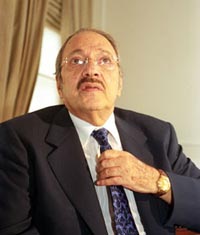Saudi prince shocks royal family

A prominent Saudi prince said that he planed to form a political party in a country that bans such groups, and that he would invite jailed reformists to join it in a step likely to anger the royal family.
Prince Talal bin Abdul-Aziz, a half-brother of King Abdullah and the father of Saudi Arabia's richest private business tycoon, also criticized, in an interview Monday with The Associated Press, what he termed an alleged monopoly on Saudi power by one faction within the Saudi royal family.
He did not name members of the faction, but was apparently referring to some of the country's most powerful princes - Crown Prince Sultan, Interior Minister Prince Naif and Riyadh governor Prince Salman. Those princes, all likewise sons of the Saudi founder, King Abdul-Aziz, as are Talal and the king, are referred to as the "Sudairies" after their mother's family.
Such a call for reform by someone inside the royal family is rare. Prince Talal holds no government post and is considered something of an outsider within the royal family, because of his past pushes for reform dating back decades, which forced him into exile briefly in the 1960s.
But Talal also is believed personally close to and a confidante of the current king, who he praised as a reformer who faces "obstacles before him."
Saudi officials had no immediate comment. The royal family rarely comments publicly on internal issues.
In the AP interview, which was conducted at a location outside Saudi Arabia, Talal also criticized the jailing of pro-reform advocates within the kingdom, and said they are welcome to join his party when it is established.
"I know this is not an easy thing to do, and we have a lot of obstacles ahead of us, but we have to start forming this party," he said.
He provided few details, but said he wants the party to break a power monopoly by some members of the family who have been "holding executive power for some 70 years."
"This is a group which is not only blocking reform, but is also trying to eliminate others and take everything in its hand," he said. "We, in particular the sons of Abdul Aziz, should take part, both in expressing opinions and in decision-making."
Prince Talal said the party he intends to form should also be a platform to allow all Saudis, including non-royals, to express their views and share decision-making powers. He pointed to neighboring Gulf nations like Kuwait, Bahrain and Oman that have already opened up their conservative political systems and held elections for legislatures.
"Saudis are asking why these small countries have followed this direction and not we?" he said.
Among reforms Prince Talal has suggested in the past are an elected assembly to enact legislation, question officials and protect public wealth. He also, in the interview, called on the kingdom's powerful Wahabbi religious establishment to make changes, including on women's rights.
"We have signed international conventions, such on women's rights, and we should respect them," he said.
The group of Saudi activists that Talal cited have been in jail for months for advocating reform. The prince called them "prisoners of conscience not criminals. They should be either tried in an independent court or set free."
Talal, who is in his 70s, fled to Egypt in 1962 because of his ideas, which he insists do not contradict Islam or jeopardize the kingdom's Islamic credentials.
There were reports at the time that he was planning an Egyptian-backed revolt against the then-Saudi king, King Faisal, and he became known as the "Red Prince" for his close ties to then-Egyptian President Gamal Abdel Nasser, who was pro-Soviet.
But he was allowed to return in 1964 after reconciling with Faisal and now heads a charity, the Arab Gulf Program for United Nations Development Organizations.
He is the father of billionaire businessman Prince Al-Waleed bin Talal, who Forbes ranks as the world's 13th richest person.
On one particularly sensitive issue, Talal called for an independent British-Saudi committee to probe allegations that some Saudi royal family members have received kickbacks from oil and arms deals.
The U.S. Justice Department said this summer that it had opened an investigation into allegations that BAE Systems, one of the world's largest arms makers, had funneled money to Saudi Prince Bandar bin Sultan, a former ambassador to the U.S., to help win a US $86 billion weapons deal.
Bandar, who now heads Saudi Arabia's National Security Council, has denied that he profited from the aircraft deal negotiated in 1985.
Former British Prime Minister Tony Blair also came under criticism earlier this year for calling off an investigation of BAE's dealings with the Saudi royal family.
"A joint independent Saudi-British committee should be formed to probe this, and if the accusations are proved, then the minimum that should be done is to return the kickbacks to the treasury," Talal said.
Subscribe to Pravda.Ru Telegram channel, Facebook, RSS!


